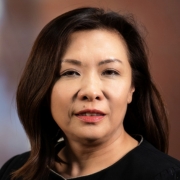Member Spotlight: Rong Mao
 Rong Mao, M.D.
Rong Mao, M.D.Rong Mao, M.D., FACMG, is medical director of molecular genetics and genomics at ARUP laboratories. She is also a professor in the Department of Pathology at the University of Utah and the program director of Laboratory Genetics and Genomics (LGG) Fellowship there.
This interview has been edited for length, clarity and style.
Tell us about your current role. How does your work help patients?
I am a medical director for the Molecular Genetics and Genomics Laboratory, which provides accurate and timely results to aid the diagnosis and follow-up of patients with genetic conditions. I am so proud that our laboratory is recognized nationally for superb quality and turnaround time.
Academically, I am a professor of pathology. My research efforts focus on the University of Utah Undiagnosed Disease Program, a research study to seek to provide answers for patients and families affected by these mysterious conditions.
On the education front, I am the program director for our ACGME–accredited Laboratory Genetics and Genomics (LGG) Fellowship.
As a translational researcher working to bring innovation to the clinic, observing the trends in the molecular genetics workspace, I decided to take the advice of my mentor, Dr. Elizabeth Berry–Kravis, to get training in clinical molecular genetics to advance my passion of doing more for the patient.
I help patients through my clinical work and my research. My job is to provide accurate interpretation to guide diagnosis, prognosis and therapeutic decision-making. It is always rewarding when I see patients' and their caregiver’s satisfaction after the consultation of the testing results.
Who or what inspires you?
Our patients are the biggest inspirations to me. I get the privilege of helping patients during their most important, and often the most challenging, moments of their lives. The ability to contribute to their care, and potentially their cure, is truly inspiring.
What is the best part of your work? What are the greatest challenges?
The best part is serving patients. It is a big reward when I make a diagnosis for a patient with a mysterious disease and potential cure. I enjoy interactions with my colleagues and learning from them, as well as mentoring trainees and early-career colleagues.
The greatest challenge is trying to keep up with everything. There are new technologies, new data, new companion diagnostics, new clinical guidelines. It is a rapidly evolving field.
How long have you been an AMP member, and why did you join?
I joined AMP when I was a molecular genetics fellow in 1999 and have been a member since. AMP is an organization that allows me to connect with my peers from other institutions. I learn a lot by volunteering on committees and working groups.
What do you think are the most valuable aspects of AMP membership? What resources/courses have advanced your career?
AMP is very influential in the molecular diagnostic community. AMP advocates for molecular professionals and collaborates with other professional societies, patient organizations, local and federal government, agencies and industry to develop resources and policies. AMP is the leading organization to influence polices and regulations on the national and international levels.
Active participations in the AMP Genetics Subdivision and working groups, such as Whole Exome Sequencing Standards Working Group, have significant helped me advance my career.
How have you been involved with AMP? What do you enjoy most?
I have been a member of the AMP Genetics Subdivision and Training & Education Committee. I am chair of AMP Whole Exome Sequencing Standards Working Group. I enjoy most the motivation from every member in the working group and have found it meaningful. Our working group crafts guidelines and recommendations that will provide a useful framework for the best clinical practice of genomics sequencing.
What’s your advice to early career/trainee/new AMP members?
Join AMP and be a member!
AMP has opportunities for trainees and early-career pathologists, geneticists and scientists. I would encourage the new members to volunteer with the committees and working groups.
There are discounted membership fees for the trainees and students.
I would encourage new members to attend the annual meeting. It is the most efficient and enjoyable way to learn about everything AMP has to offer.
The CHAMP listserv is the best source for AMP updates.
Suggestions welcome!
Do you know an AMP member deserving of being profiled in the Member Spotlight? Let us know at amp@amp.org!















